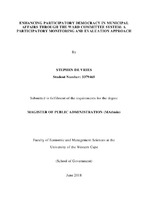| dc.description.abstract | Local government is a key point of service delivery and is the sphere where most people interface with government. A good relationship with communities at local government level is therefore critical. Ward committees were designed to improve the relationship between citizens and municipalities and to give effect to the constitutional obligations of municipalities, to provide democratic government and to involve citizens in the affairs of local government.
The establishment of ward committees has been met with great enthusiasm by local communities, as a platform to engage with municipalities. National government and provincial governments were key drivers in this project, with support to municipalities in the establishment of ward committee. This endeavour was intended to facilitate better relationships and cooperation between council and its communities.
This objective of this research study was to explore whether participatory democracy can be enhanced through a participatory monitoring and evaluation approach within the current ward committee system. The main research question was whether ward committees could be utilised as effective instruments for participatory monitoring and evaluation of municipal service? The sub-questions were: what is the theoretical and legal framework for ward committees; what was the status of ward committee in Knysna Municipality; what were the challenges of the ward committee system; is there a role for ward committees in participatory monitoring and evaluation; and were there recommendations for the involvement of ward committees in participatory, monitoring and evaluation and improvement of the efficacy of ward committees?
The study arose out of continuous service delivery protests by communities because of the dissatisfaction with the state of municipal services. Secondly, various research studies have found that, despite national, provincial and local government support programmes for ward committees, the majority remain ineffective and inefficient, and the social distance between communities and municipalities is growing. The lack of communication and the non-responsiveness of municipalities were found to be some of the main causes for the ineffectiveness of ward committees. Key theorists suggest that some of these protests would not occur if effective monitoring and evaluation are institutionalised and communities are involved in monitoring and evaluation. A participatory approach for
iv
monitoring and evaluation was therefore examined within the local government legislative framework of South Africa.
A qualitative research method was chosen, using a case study design. The case study design was chosen because such studies do not attempt to make any generalisations in term of the results or that it will be similar in another case study. This study was focussed on exploring and understanding the issue. Primary data was collected through interviews and focus groups with ward committee members, ward councillors and municipal officials.
Key findings gave emphasis to challenges of lack of communication, non-responsiveness of municipalities and contestation from other community-based organisations that had a negative impact on the credibility and authority of ward committees. The effectiveness of the municipal performance management system as a monitoring and evaluation tool was also questioned in the findings.
The significance or value of the study lies in the finding that willingness for participatory monitoring and evaluation exists as does the insight into the status of municipal performance management systems. Recommendations are made for delegating monitoring and evaluation functions to ward committees. Further investigations into modalities for participatory or result-based monitoring and evaluation, as well as the impact of financial and audit driven performance management system are recommended. | en_US |

